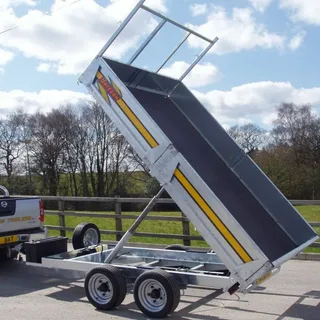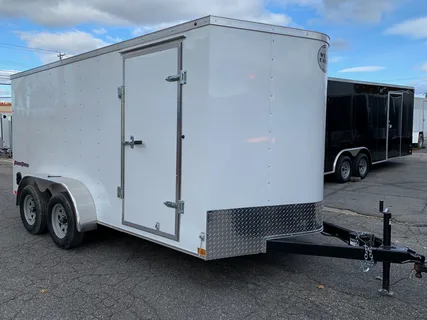When transporting materials, Hydraulic Tipping Trailers are a game changer. They make the task easier, faster, and more efficient. But with great power comes great responsibility, and using these versatile trailers safely is essential for protecting operators and bystanders. Whether you’re a seasoned professional or just starting in heavy machinery, prioritizing safety should always be your top focus. In this blog post, we’ll explore best practices for using Hydraulic Tipping-Trailers effectively while minimizing risks on the job site.
Understanding How Hydraulic Tipping-Trailers Work
Hydraulic Tipping-Trailers are innovative tools designed to make transporting heavy loads more efficient. They utilize hydraulic cylinders, which convert fluid pressure into mechanical force, enabling the trailer bed to tilt and unload materials quickly. This mechanism allows for swift unloading without requiring manual labour.
The operation begins when the driver activates a control switch, directing hydraulic fluid into the cylinder. As pressure builds up, it raises one end of the trailer while keeping it stable on its axle. This controlled tipping action ensures that materials are offloaded safely and accurately.
These trailers come in various designs and sizes to accommodate different needs. Whether hauling gravel, debris, or farm produce, understanding their functionality is crucial for maximizing efficiency and safety during operation. Proper use can significantly enhance productivity across numerous industries.
Inspecting the Trailer Before Use
Inspecting your hydraulic tipping trailer is crucial before hitting the road or starting a project. A thorough check ensures all components are in good working order and helps prevent accidents. Look for any visible signs of damage, such as cracks or rust on the frame. Pay attention to the hydraulic system; leaks can lead to operational failures.
Next, examine the tyres for proper inflation and tread wear. Underinflated or worn-out tyres can compromise stability during operation. Don’t forget to check the lights and brakes—these features are essential in safe towing.
Ensure that all safety equipment is present and functional. This includes reflectors, safety chains, and any emergency braking systems required by law. Taking these steps before use will help guarantee a safer experience with your hydraulic tipping trailer.
Proper Loading Techniques for Safe Operation
Loading a hydraulic tipping trailer correctly is crucial for safe operation. Here are some essential techniques to follow:
Understand the Trailer’s Capacity
Knowing your trailer’s maximum weight capacity is fundamental. Overloading can lead to severe consequences, including accidents and damage to the trailer. Always adhere to the manufacturer’s specified weight limits.
Proper Weight Distribution
Distribute the load evenly across the trailer bed. Avoid placing excessive weight on one side or the other. A balanced load ensures stability and prevents the trailer from tipping during operation.
Secure the Load
Use appropriate tie-down straps or chains to secure the load, especially when transporting loose materials. This prevents the load from shifting during transit, which can cause accidents or damage to the cargo.
Consider the Center of Gravity
The centre of gravity of the load should be as low as possible. Avoid stacking loads too high, as this can raise the centre of gravity and make the trailer more prone to tipping.
Regular Inspection
Before each use, inspect the trailer’s hydraulic system, tyres, and braking system for any signs of wear or damage. Ensure that all components are in good working condition to prevent accidents.
Ensuring Stable Ground Conditions for Tipping
Ensuring stable ground conditions is crucial when operating Hydraulic Tipping-Trailers. Unstable or uneven terrain can lead to accidents, damaging the trailer and its contents. Before you begin tipping, assess the area where you plan to unload. Look for any slopes, holes, or loose soil that could compromise stability. It’s essential to choose a flat surface whenever possible. This will help distribute weight evenly and reduce the risk of tipping over.
Be cautious of soft spots in the ground as well. These areas may seem harmless but can give way under the weight of your load during the unloading process. Moving to a safer location is best if you need clarification on a particular spot’s stability.
Consider environmental factors such as recent rainfall or extreme temperatures affecting ground integrity. Wet conditions can lead to mudslide risks, while frozen surfaces might crack under pressure. By taking these precautions seriously and ensuring solid footing for your hydraulic tipping trailer operations, you’ll protect your equipment and prioritize safety for everyone involved on-site.
Operating the Hydraulic Mechanism Safely
Operating the hydraulic mechanism of tipping trailers requires careful attention to safety protocols. Always familiarize yourself with the control layout before engaging the system. Each trailer may have different controls, and understanding them ensures safer operation.
Before activating the hydraulic lift, confirm that the trailer is securely attached to your vehicle and that there are no obstructions nearby. A clear workspace minimizes hazards and allows for a smooth tipping process.
When ready to operate, engage the hydraulic system slowly and steadily. Avoid sudden movements or excessive force leading to accidents or equipment damage. Throughout this process, keep an eye on load stability; it’s crucial for maintaining balance as materials shift during tipping operations.
Where to Buy Hydraulic Tipping Trailers for Sale
Finding the right Hydraulic Tipping Trailers for Sale can feel overwhelming, with many options. Start by checking local dealerships that specialize in agricultural or construction equipment. They often carry a range of models and brands, allowing you to see trailers up close.
Online marketplaces are another excellent resource. Websites like eBay, Craigslist, and specialized equipment sites provide listings from dealers and private sellers. Just review seller ratings and descriptions carefully before making any commitments.
Make sure to pay attention to manufacturer websites, too. Many reputable companies offer direct sales or can connect you with authorized distributors in your area. This way, you’ll have access to expert advice on selecting the best hydraulic tipping trailer for your needs while ensuring quality assurance directly from the source.
Recognizing and Avoiding Common Safety Hazards
Hydraulic Tipping-Trailers are potent tools, but they come with inherent risks. One common hazard is overloading the trailer beyond its capacity. This can lead to instability during operation, increasing the likelihood of accidents. Always check the manufacturer’s specifications before loading.
Another risk involves improper terrain conditions. Soft or uneven ground can cause tipping trailers to shift unexpectedly during unloading, posing a danger to operators and bystanders. Assessing the ground beforehand is crucial for safe operations.
Always pay attention to the importance of proper training. Many incidents occur due to operator inexperience or neglecting safety protocols. Ensure that anyone using Hydraulic Tipping-Trailers understands their mechanics and adheres strictly to safety guidelines to minimize potential hazards on-site.
Maintaining Your Hydraulic Tipping Trailer for Safety
Regular maintenance of your hydraulic tipping trailer is crucial for safety. Start by checking the hydraulic fluid levels and inspecting hoses for signs of wear or leaks. Keeping these components in good condition ensures smooth operation and prevents unexpected failures.
Next, pay attention to the trailer’s structural integrity. Examine the frame, joints, and welds for cracks or deformities that could compromise stability during use. A well-maintained chassis can significantly reduce risks while operating under load.
Remember the tyres and braking system, too. Ensure that tyres are correctly inflated with adequate tread depth to handle various terrains safely. Regularly test brakes to ensure they function correctly when needed most, especially on inclines or uneven surfaces. Staying proactive with maintenance safeguards not just your equipment but also your safety on every job site.
Conclusion
Hydraulic Tipping Trailers are valuable for various industries, enhancing efficiency and convenience. However, safety should always be the top priority when using them. Adhering to best practices ensures not only your safety but also prolongs the lifespan of the trailer. You create a safer working environment by understanding how these trailers work, inspecting them before use, and following proper loading techniques. Also, maintaining stable ground conditions is crucial during operations to prevent accidents. Investing in quality Hydraulic Tipping-Trailers and practising regular maintenance will greatly enhance their performance. Awareness of potential hazards can significantly reduce risks associated with their use. Embrace these practices to enjoy all their benefits while keeping safety at the forefront.
FAQs
When considering Hydraulic Tipping-Trailers, it’s common to have questions. Here are five frequently asked queries:
What is a hydraulic tipping trailer?
A hydraulic tipping trailer is designed to transport and unload materials efficiently. Its hydraulic system allows the trailer bed to tilt.
How do I choose the right size for my needs?
Selecting the right size depends on your requirements, including load capacity, material types you plan to transport, and vehicle compatibility.
What maintenance is required for these trailers?
Regular hydraulics, brakes, tyres, and frame inspections are essential. Lubricating moving parts and checking fluid levels will ensure optimal performance.
Are there safety features I should look for in Hydraulic Tipping Trailers for Sale?
Look for features such as stabilizing legs or outriggers that help maintain balance during unloading in Hydraulic Tipping Trailers for Sale. Additionally, automatic shutoff systems can enhance safety when hydraulic functions are used.
Where can I find reliable dealers or manufacturers?
Research local dealerships that specialize in agricultural or construction equipment. Online platforms also provide listings of reputable suppliers with customer reviews.
Hydraulic Tipping-Trailers offer efficiency but are responsible for safe usage and routine maintenance. Address any concerns directly with manufacturers or seasoned operators before purchasing.
| Related Business Listings |
| Contact Directory |
| Local Business Profiles |




